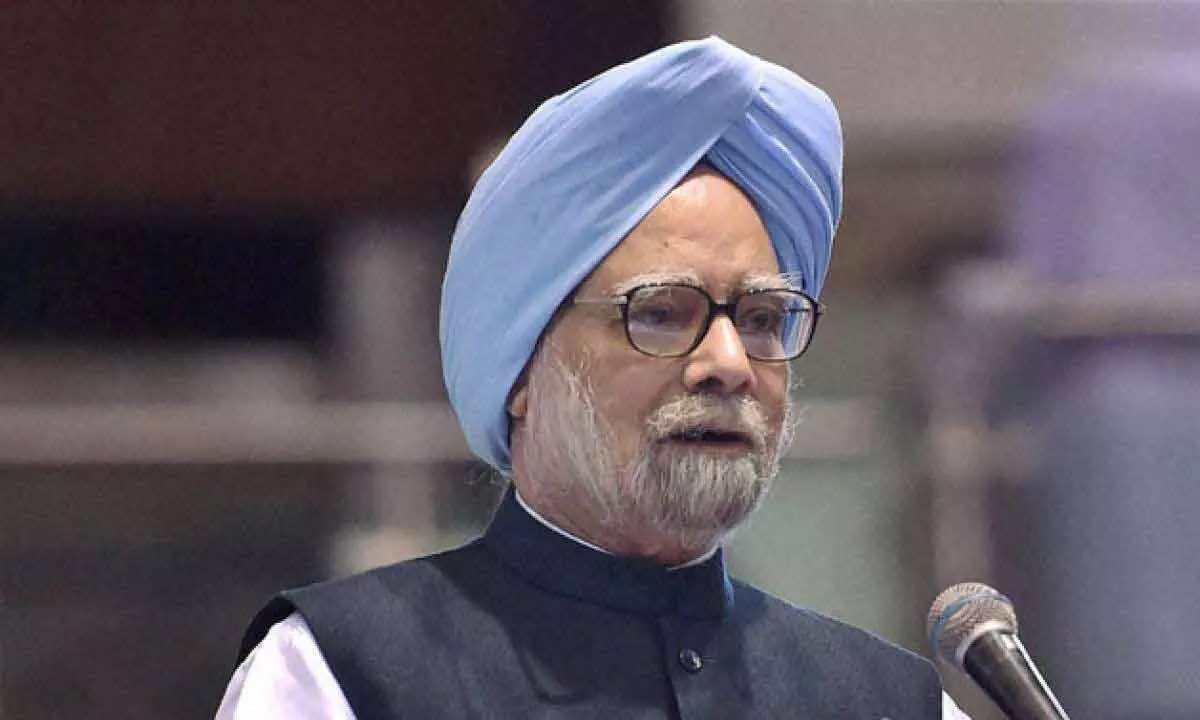Live
- Poonch terror attack: Security forces release sketches of two terrorists
- Constituency Watch: For BJP it’s fight for consolidation while Congress sees an opportunity to regain past glory in Nandurbar
- Congress, BRS, AIMIM following Muslim League agenda: J P Nadda
- PeopleStrong, Google Cloud join hands to transform employee experience with AI
- Siguler Guff invest Rs 240 crore in Hyderabad-based microfinance lender Spandana Sphoorty
- 'BJP CM will take oath in Odisha on June 10', roars PM Modi at Berhampur rally
- Five-year-old boy found dead after being swept away in Texas floodwaters
- Akhilesh appoints Shyam Lal Pal as new state president of SP
- Manipur: Educational institutions close for two days after heavy rains, hailstorm
- End of BJD rule on June 4, says Modi
Just In
A legendary reformer & moral compass to nation


Veteran Congress leader and former Prime Minister Manmohan Singh, 91, retired from active politics on Wednesday, ending his 33-year-long parliamentary...
Veteran Congress leader and former Prime Minister Manmohan Singh, 91, retired from active politics on Wednesday, ending his 33-year-long parliamentary innings in the Rajya Sabha.
The nonagenarian leader is a thinker, scholar and reformer combined into one, with an impeccable integrity and unwavering commitment to the nation. He is a great visionary whose thoughts and reforms paved for a historic transformation and resilience of Indian economy.
Singh is India’s fourteenth and first Sikh Prime Minister (2004-2014). His brilliance and vision and determination have left a deep impact on Indian economy, while his unassuming demeanour and principled conduct make him stand apart in the rough and tumble of Indian politics. He is well regarded by his admirers and critics alike for his diligence and academic approach to work.
Manmohan Singh, hailing from Punjab, was a studious student who went on to earn his D.Phil in Economics from Oxford University in 1962. Two years later, he came out with an incisive critique of the Indian economy, particularly its inward-looking trade policy, in his first book, ‘India’s Export Trends and Prospects for Self-Sustained Growth.’ He had a stint at Punjab University and Delhi School of Economics. His first assignment in the GoI was as Economic Advisor in the Commerce Ministry and the positions he held subsequently included Deputy Chairman of the Planning Commission; Governor of the Reserve Bank of India; Advisor of the Prime Minister; and Chairman of the University Grants Commission. He joined UNCTAD as the Secretary General of the South Commission in Geneva from 1987-1990.
In what could be termed as a significant turn in the economic history of nation, which saw his plunge into active politics, the then Prime Minister P V Narasimha Rao recognised his worth and took him aboard as his Finance Minister for the term 1991-1996. He became a parliamentarian as a Member of the Upper House in October 1991. Within a month he presented a unique Union Budget. That marked the ascent of India as a rapidly growing economy. His impassioned call to the nation to tread the painful but imperative path was embellished with the words of 18th century French poet and politician, Victor Hugo: “No power on earth can stop an idea whose time has come.” He calmed the nation’s frayed nerves in the face of a financial crisis: “We shall prevail. We shall overcome.”
Never-before-seen reforms were unleashed during his FM tenure, unshackling the licence raj, opening up several sectors to private participation, selling off dispensable public assets and integrating India with the global market by shedding protectionism. His reforms - liberalization, privatization, and globalization - fueled rapid growth of India. If India has emerged the fastest growing economy in the world, raring to reach $5 trillion in next 3 years and $7 trillion by 2030, it owes its vision and direction to Dr Manmohan Singh.
The Indo-US civil nuclear agreement in 2005 shows Dr Singh’s political acumen, too. To him goes the stellar credit of helping India emerge the only country with nuclear weapons which is not a party to the Non-Proliferation Treaty (NPT) but is still allowed to carry out nuclear commerce with the rest of the world.
The other day, Singh went to parliament in a wheelchair to cast his vote on a key issue, setting an example for other MPs to take their duties seriously. PM Modi said Singh’s contribution has been immense. “For such a long time, the way he guided this House and the country, he will always be remembered for it,” he said of the former PM.His name shall be etched in golden letters in the annals of India’s economic history.

© 2024 Hyderabad Media House Limited/The Hans India. All rights reserved. Powered by hocalwire.com






